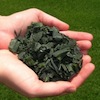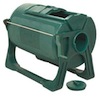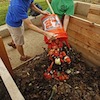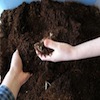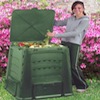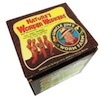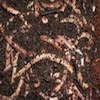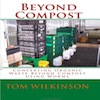Soil, Compost and Mulch
Mulch Types Of all the improvements you can make to your yard, perhaps adding a thick layer of landscape mulch to your landscape beds is one of the best decisions you can make.
We will review many of the most commonly available mulch types, where they perform the best, the qualities of each and the organic qualities and how they can improve you garden soil makeup.
Read more about Mulch Types in this informative article.
Composting 101 Are you just getting started with composting? Or do you just need a refresher course on this great eco-friendly method of handling your yard and kitchen waste? Composting, which done correctly, will yield some of the best organic garden soil you can find anywhere and everyone that has a few square feet of yard space can easily do it all year long.
Read this educational article about composting at home in our article: Composting 101 and have your landscaping looking great in no time.
Making Compost Beginning the composting process does not require a large investments, nor does it required a lot of technical expertise, but before you start you should obtain the proper tools and know-how to become a successful compost gardener. This article will get you going on the path for producing rich, organic compost for your landscape in no time at all.
Be sure to read the article Making Compost to be well-informed as to the proper tools and techniques to produce your first batch of nutrient-rich compost.
How To Compost Above Ground Composting your organic waste can be as easy as putting it in a pile, creating a freestanding, no-bin compost pile and you are in business. We will give you all of the information that you will need to get started in the fine art of composting, if you wish to keep your expenditures to a minimum. you will learn all of the ins and outs of composting and can then easily graduate to other more efficient and neater forms of composting.
Visit our article on making a How To Compost Above Ground to get all the tips you need to begin your above ground compost pile going today!
Compost Pit Making a Compost Pit is a simple and effective way to create compost from your organic waste materials. Burying your organic matter underground is a virtually maintenance-free composting option for those with space available for digging who want to create compost without the effort or threat of pests.
Visit our article on making a Compost Pit to get all the information you need to begin your compost pit going today!
Compost Container While freestanding and underground composting work just fine, you may want to consider a container for your compost.
A compost container will keep your pile out of view, safer from pests, and keep it from blowing away in the wind. Container composting also makes it much easier to control the conditions in your pile, including moisture and temperature levels.
Visit our article on Compost Container to find out about composting a very simple and clean way.
Worm Composting For those who want to dispose of organic waste matter in an environmentally-friendly way but don't want a conventional compost pile, worm composting is a popular alternative.
Worms do most of the work for you and they also provide the richest and most desirable compost material for your garden and landscape.
Visit our article on Worm Composting and find out how to make your own worm composting operation.
Vermiculture - A healthy composting worm bin shouldn't give off any bad odors or attract insects. If you notice suspicious smells, bugs, or other issues like dead worms or mold, there are simple steps you can take to alleviate the problem.
Even though the worms are still doing most of the work, you can turn them into "super-producers" with a few easy tips.
Visit our article on Vermiculture and find out how keep your worms working at top efficiency.
Vermiculture Troubleshooting - A healthy composting worm bin shouldn't give off any bad odors or attract insects. If you notice suspicious smells, bugs, or other issues like dead worms or mold, there are simple steps you can take to alleviate the problem.
So if you are experiencing some problems, visit this article for the answer to you troubles and get "on-track" with your worm composting.
Visit our article on Vermiculture and find out how keep your worms working at top efficiency.
comments powered by Disqus
































































